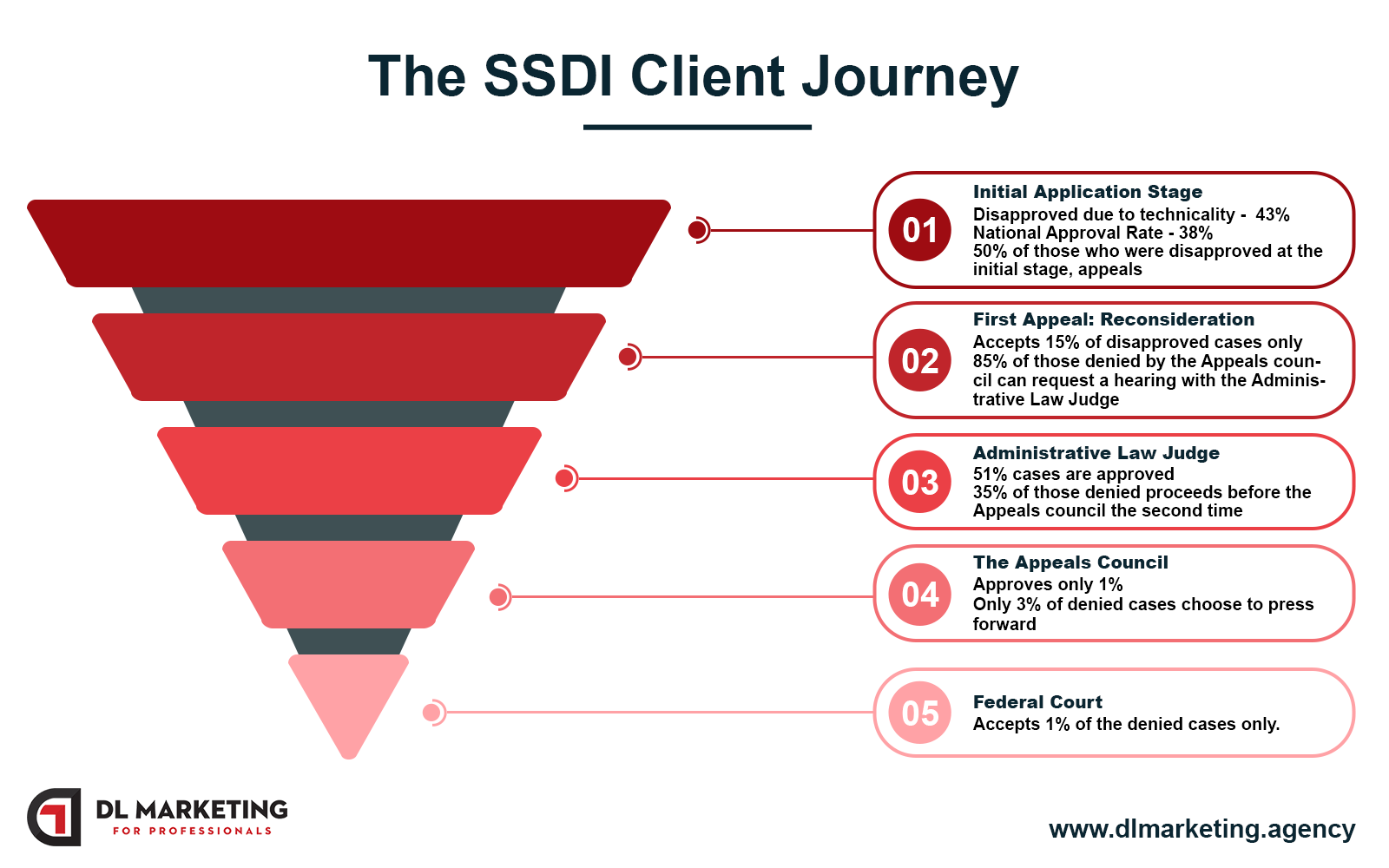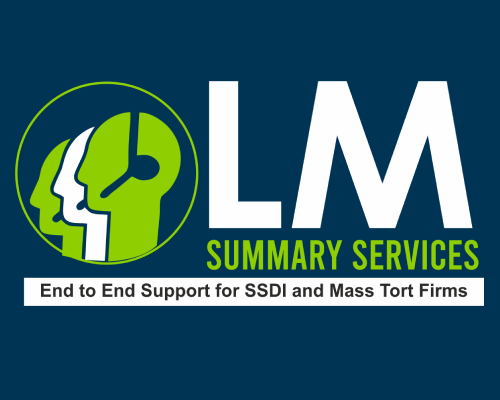Welcome to the pivotal conclusion of this series. While the first two parts showcased the winning formula in running your Social Security Disability (SSD) Law Practice/Firm/Advocacy with efficiency, we have yet to address the cruel wind blowing into the business of SSD law firms: minimizing client drop-offs and maximizing SSD benefits win-rate.
The real measure of an SSD practice’s success isn’t found in the latest tech, the most innovative campaigns, or having a massive caseload; it’s in retaining clients over the long haul and making sure they are awarded the benefits they deserve. To achieve this, your SSD law firm/advocacy needs to assemble and deploy an all-star team, with each member specialized in handling specific steps of the SSD application process, and who leverage your marketing and communication systems.
The SSDI Client Journey

The Social Security Disability Insurance (SSDI) process is a complex, multi-step journey that can be daunting for applicants. Many find the process to be so burdensome that SSDI applications fell by 35% from 2010 to 2023, while awards dropped by nearly half. Consequently, the total number of disabled worker beneficiaries declined by nearly 2.4 million between 2014 and 2023.
Some applications are expedited, such as those for acute leukemia, ALS (Lou Gehrig’s Disease), pancreatic cancer, or those predicted by a computer model to be highly likely to qualify. Otherwise, the process can take months or years and involve multiple appeals.
“Without a doubt, retaining clients and successfully guiding them through the long and challenging SSD application journey, until benefits are awarded, should be the top priority of Social Security Disability Law practitioners/firms/advocates"
Applicants who fail to meet the Social Security Administration’s technical eligibility criteria, such as insufficient work history or lack of Social Security coverage, may be denied benefits prior to a formal medical assessment. Knowing that “technical denials” constituted approximately 43% of initial applications (in 2021), many potential applicants are deterred by the complexity and bureaucratic nature of the process.
The national approval rate for initial applications is approximately 38%. While approximately 50% of applicants who were denied benefits at the initial stage chose to appeal the decision, as reported by the SSA. The first appeal step, called “reconsideration,” involves a new review by the local Disability Determination Services (DDS), which approves approximately 15% of cases only. Most of the remaining denied applicants can appeal again by requesting a hearing with an Administrative Law Judge (ALJ).
Despite efforts to streamline the process, the wait time for an ALJ could pose a significant emotional and financial hurdle, especially for those with limited resources or health conditions. The case hearing can be lengthy, often spanning months or even years. The national average wait time in October 2023 was 372 days, but in some regions, like Ponce and Santa Barbara, the wait time extends to nearly 600 days.
Nationally, 51% of ALJ hearings resulted in approval. Of the applicants who were denied benefits at the ALJ level, approximately 35% chose to appeal the decision and proceed to a hearing before the appeals council. However, only roughly 1% of disability benefits cases heard by an appeals council resulted in approval. Only 3% of applicants who were denied chose to continue to appeal further. Appeals heard by the federal court ultimately accepted approximately 1% of cases.
These high denial rates contribute to the substantial number of client drop-offs throughout the process. Without a doubt, retaining clients and successfully guiding them through the long and challenging SSD application journey, until benefits are awarded, should be the top priority of Social Security Disability Law practitioners/firms/advocates.
The People Behind the Intake Process

Given the long application process and uncertainty of outcomes, the client-firm relationship is critical to ensure that the people who need SSDI and SSI benefits are guided correctly and reassured by the fact that someone capable is fighting on their behalf.
Therefore, to maximize efficiency, many SSD practitioners/firms/advocates divide their intake department into two teams: pre-intake and intake.
In the pre-intake stage, the first connection is made between a potential client and the service provider. This interaction serves to gather essential information and determine if the individual’s needs align with the firm’s case criteria.
Once interest is confirmed, the process moves to the intake phase, which is a more formal step designed to collect detailed information and evaluate the potential client’s eligibility. This involves either warm transferring the call or setting up an appointment to introduce the potential new client to your intake team.
From here, the potential client goes through a series of steps involving the collection of relevant client information (medical history, work experience, and personal details), assessment of whether they’re a good fit, and onboarding. This information is crucial for determining eligibility and guiding the subsequent steps of the process.
After obtaining client paperwork and their corresponding electronic (obtained through e-signature features of CMS) and wet signatures, clients are sent an encouraging welcome letter from the SSD law firm/advocacy, alongside a unique case ID.
The full-intake process can take an hour or more, sometimes over several sessions, and many times potential clients do not complete this step. This stage of the SSDI process often is the first client drop-off or leakage point.
Many other factors contribute to drop-off at this point such as would-be applicants being busy, needing help obtaining information, requiring assistance with paperwork, or utilizing technology such as online apps, plus the daunting prospect of having to wait months or years to obtain a positive decision on their SSDI/SSI application.
To maximize efficiency in completing the intake process, and alleviate client concerns, teams need to make use of the marketing and communication systems (CRM + marketing automation + dialer) that helped them connect with potential clients (leads) in the first place.
An effective CRM and marketing automation system allows firms to zoom in on potential clients at the intake step and implement tactics to help alleviate their concerns and complete the intake.
For example, once the initial contact is made and a potential applicant’s case merits have been validated, the agent can conclude the call by first making sure the future client receives any needed preliminary information on the next steps and requirements, as well as booking an appointment in an online calendar to complete the intake. This can be triggered instantly with the right CRM.
CRMs should also have the capability to classify these types of cases with a status like “pending intake”, which should automatically trigger the submission of the prospective client into an email and SMS campaign, tailored with their personal contact details and with further information on next steps, what to expect, requirements, etc. Other options to leverage are automated reminders for any upcoming events or appointments, or to-dos on the client side.
Case Managers as Well-Being Coaches

Once the initial intake is complete, Case Managers take over, assuming a more comprehensive role in guiding clients through the entire SSDI process. Case managers are more focused on client interaction and case management. They are responsible for reviewing medical records, assisting with document preparation, and interfacing with the Social Security Administration (SSA) to complete the Initial Application (IA) for clients.
Case Managers are particularly important after the Disability Determination Services (DDS) call, as they provide support and guidance to clients who may be feeling overwhelmed or confused, often addressing their concerns, updating them on the statuses of their cases, and answering their questions.
Using Client Relationship Management tools, case managers can employ various empathy strategies aimed at increasing client satisfaction and decreasing dissatisfaction at the same time.
First, they establish open and honest communication with clients, keeping them informed about the status of their claims and potential delays. By providing realistic expectations and transparency, case managers can alleviate anxiety and frustration.
Secondly, they offer emotional support and encouragement, recognizing the challenges and stress that applicants may be facing. By empathizing with their situation and offering words of encouragement, case managers can help motivate clients.
Additionally, case managers can provide practical advice for navigating the process, such as how to gather necessary documentation or how to prepare for a hearing. By empowering clients with knowledge, they can boost their confidence and increase their likelihood of success.
Case managers can leverage marketing automation to keep clients regularly updated via email and SMS. By automating regular status updates and positive reinforcement messages, they can effectively mitigate client anxiety.
By consistently engaging with clients through automated emails and SMS with infographics, informative videos, etc., case managers can maintain momentum and positive client experience.
Back Office Agents

Back Office Agents play a vital role in processing paperwork, verifying information, and ensuring compliance with regulations.
Back-office agents are the unsung heroes of Social Security Disability Law Practice/Firm/Advocacy, working behind the scenes to ensure the smooth operation of cases. They play a crucial role in supporting case managers and maintaining client engagement throughout the SSD process.
A key responsibility of back-office agents lies in using document management tools, often included in Case Management Systems (CMS) such as Clio Manage, to streamline administrative tasks associated with each case. This includes gathering and organizing medical records, preparing necessary documentation, and tracking deadlines.
To keep clients engaged, a firm’s CMS should have a 2-way sync or integration with the CRM and marketing automation system. This way, additional email and SMS campaigns can be triggered based on the progress, or lack thereof, of the client’s case.
MRR Agent (Medical Record Retrieval)

Throughout the SSD process, MRR (Medical Record Retrieval) Agents specialize in obtaining essential medical records from healthcare providers, such as doctors, hospitals, and clinics. These records are vital for building strong disability claims and demonstrating the severity of a client’s medical condition.
By efficiently retrieving medical records, MRR Agents help to expedite the SSD process. For facilities that may charge fees for these records, MRR agents can even negotiate the amount first before paying.
Using case management tools (specifically under document management), they work with case managers and attorneys to identify required medical records and coordinate their retrieval from healthcare providers. By streamlining the record retrieval process, MRR Agents help to minimize delays.
Medical Summarization Professionals

Medical Summarization Professionals play a crucial role in the SSD process by analyzing complex medical records and creating concise, clear, and accurate summaries. These summaries highlight key medical conditions, limitations, and treatment histories, which are essential for building strong disability claims. These documents are fed through document management tools available in case management systems.
To improve efficiency, the medical summary team should draft the medical brief at least 20 days prior to the hearing to allow attorneys sufficient time for thorough review before submission. In preparing for reconsiderations and appeals, the medical team must meticulously examine all medical records available in ODAR (Office of Disability Adjudication and Review) and add all necessary info in the brief.
By condensing voluminous medical records into concise summaries, Medical Summarization Professionals save time for both case managers and attorneys. This allows them to focus on developing strong legal arguments and advocating for their clients’ rights. Additionally, these summaries help to ensure that all relevant medical information is presented to the Social Security Administration (SSA) in a clear and organized manner, increasing the chances of a favorable decision.
Furthermore, Medical Summarization Professionals can help to identify potential gaps in medical records and recommend additional documentation that may be needed to strengthen a claim. By proactively identifying and addressing these issues, they can help to expedite the claims process and improve outcomes for clients.
Medical summaries performed by LM Summary Services team undergo stringent quality assurance checks to ensure complete accuracy and high quality. LMS’ 2 tier Quality Assurance Framework guarantees accuracy through client checklist compliance and visual checks.
Senior QA Analysts

Senior QA Analysts play a critical role in improving the operations, efficiency, and client services of SSD firms. By implementing rigorous quality assurance standards, they help to ensure that all aspects of the firm’s work, from case management to medical record review, are accurate, timely, and compliant with legal and regulatory requirements.
Senior QA Analysts conduct regular audits of case files, identifying potential errors, omissions, and inconsistencies. They run reports on the CRM to measure call and workflow performance against management-established key performance indicators. By proactively addressing these issues, they help to prevent delays, denials, and appeals. Additionally, they monitor key performance indicators, such as case processing times and client satisfaction metrics, to identify areas for improvement.
By implementing quality control measures, Senior QA Analysts contribute to the overall efficiency of the firm. And by reducing errors and streamlining processes, they help to save time and resources. Their focus on quality assurance helps to enhance the firm’s reputation and build trust with clients. By ensuring that clients receive high-quality legal services, Senior QA Analysts contribute to positive client experiences and increased client satisfaction.
Put your SSD practice to a Higher Gear with Proven Marketing and Reliable People

Ready to attract more clients and streamline your operations? Partner with Disability Law Marketing Agency to craft compelling marketing strategies that resonate with your clients. And to ensure your team is running at peak efficiency, turn to LM Summary Services for top-tier staffing solutions. LM Summary makes it easy for you to have all the staff you need without having to source, recruit, manage, and handle payroll responsibilities. Together, we will build and scale your SSD operations and maximize client satisfaction.





 Home
Home